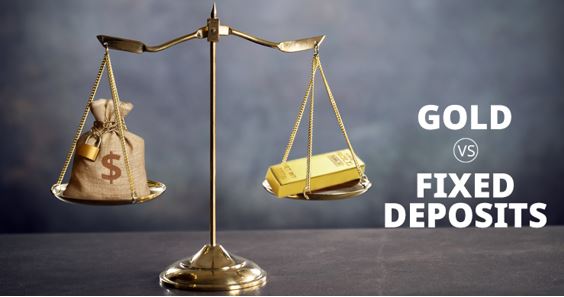Current world financial needs are not easy to meet with regular income. And hence, saving money is recommended. Investing this extra amount is the best way to safeguard your savings and gain high interest on them. Two of the best ways of investing money are Gold ETFs and fixed deposits. People often get confused between the two. This article will give you details on both investment schemes, which will help you choose between Gold ETFs and fixed deposits.
 What is the primary difference between Gold ETFs and Fixed deposits?
What is the primary difference between Gold ETFs and Fixed deposits?
Gold ETFs are the schemes where you purchase electronic gold and the value of your investment changes as per the altering rates of gold. This is a more preferred choice among investors as gold prices are rising each day. On the other hand, you need to deposit a particular amount of money and keep it fixed for a pre-decided time interval. You get higher interest rates compared to the funds deposited in savings or current accounts. Investors who choose this option are the ones who averse the risks.
Compare these factors before choosing between Gold ETFs and Fixed Deposits
-
Flexibility:
ETFs are highly flexible in terms of the amount and tenure of investment. You purchase the gold today and sell it at a later date. You will get the money as per the price of gold at the time of selling it.
But the flexibility of fixed deposits varies among the lenders and type of fixed deposits. You can choose the best fixed deposit scheme among recurring, non-recurring, cumulative, or non-cumulative fixed deposits according to your requirements. The interest and tenures vary in all cases. However, it is not as flexible as Gold ETFs.
-
Risk:
The only risk in Gold ETFs is inflation as gold prices go down. Contrary to this, fixed deposits have zero risks. Everything is pre-decided. So, you get the interest as per the commitments by the lender, and your principal amount will be returned safely to you at the end of the tenure.
-
Returns on Investment:
ROI of gold ETFs depends on demand and supply of gold in the market that ultimately decides the price of gold. Your gains or loss remain uncertain in this situation. However, there is no limit to gains in Gold ETFs, whereas the interest rates of fixed deposits do not surpass specific limits. The highest fixed deposit interest rates are available for senior citizens.
-
Liquidity:
ETFs have the highest liquidity. You can make this investment through mutual funds, bullion, or equities. Sell them at any time and get the money as per the gold prices. But fixed deposits lack enough liquidity, though it varies with every lender. Premature money withdrawal from fixed deposits may land you in penalties or interest amount deduction. Sometimes, you may not get any interest in such instances.
-
Tax benefits:
Investing for consistently a year or more in Gold ETFs can give you the benefit of long-term capital gain tax. You can gain a maximum of 20% of your taxes as your investment capital during the tenure of your Gold ETFs. But the interests you earn on fixed deposits are taxable unless you fix your money in tax-saving fixed deposits. Citizens can save up to Rs. 40,000 and senior citizens can save up to Rs. 50,000 on the tax deduction amounts annually.
Takeaway
Ultimately, both schemes are suitable for investment. Choose the one that fulfils your requirements and expectations.
________________________________________________________________
Interesting related article: “What is an investment?“

